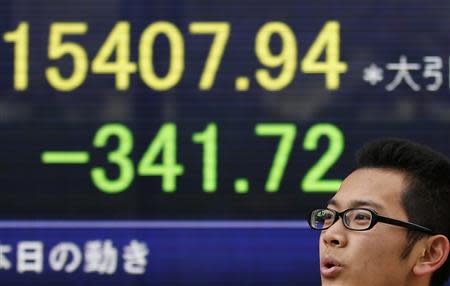Shares frozen in Fed headlights, yen hits the skids
By Wayne Cole SYDNEY (Reuters) - Asian markets were mostly restrained on Friday as investors fret over the outlook for U.S. policy stimulus, but Japanese stocks forged ahead as the yen slid to a five-year trough on the dollar. The U.S. currency romped up to 103.925 yen after finally clearing a mass of offers around 103.70/74, reaching territory not visited since October 2008. Any drop in the yen tends to be viewed as a positive for Japanese exports and corporate profits, and thus for the stock market. The Nikkei responded by rallying as much as 1.2 percent before ending 0.4 percent higher to snap three straight sessions of losses. Other share markets in Asia took their lead from a soft finish on Wall Street. MSCI's broadest index of Asia-Pacific shares outside Japan was little changed. Financial bookmakers expected major European indexes to open flat to modestly firmer. Investors were wary after upbeat data on U.S. retail sales heightened speculation the Federal Reserve might start trimming its asset buying as early as next week. The early taper talk has gained currency since last week's data showed the U.S. unemployment rate dropped to a five-year low of 7 percent in November and nonfarm payrolls expanded by a better-than-expected 203,000 jobs. "I suspect strong data will be a minor negative for risk appetite, as Fed taper concerns prevail over the obvious growth positives," said Alan Ruskin, global head of FX strategy at Deutsche Bank in New York. Which was why Wall Street reacted by shoving the Dow down 0.66 percent and the S&P 500 down 0.38 percent. At the same time, yields on 10-year Treasury debt popped back up to 2.88 percent and gave the U.S. dollar a lift. "From a U.S. dollar perspective this is at best only a mild positive, best played through yen and the usual emerging market suspects," added Ruskin. "The muted market reactions suggest nobody would be terribly surprised with a December taper, even if the street has yet to reach a consensus on timing." The Fed meets on Tuesday and Wednesday and, while much of the market still thinks it will wait until January or March, the decision on tapering is likely to be a very close call. YEN BACK ON THE SKIDS The rise in U.S. bond yields helped the dollar recoup all the losses suffered on the yen early in the week, while the euro also made a fresh five-year peak at 142.82 yen. The single currency was otherwise sidelined on the dollar at $1.3749. Some currencies in Asia have also been losing ground amid concerns an eventual tapering by the Fed will draw capital away from their markets. Indonesia's rupiah hit a near five-year low of 12,058 per dollar, while the Malaysian ringgit and the Indian rupee also lost ground. Another casualty was the Australian dollar, which sank a U.S. cent to $0.8935 after the head of the country's central bank reiterated his desire for a lower currency. Reserve Bank of Australia (RBA) Governor Glenn Stevens confirmed that he would rather see any further easing in domestic financial conditions come through a drop in the Aussie, rather than a cut in interest rates. The central bank has for months been running a verbal campaign to get the currency down to support trade-exposed sectors of the economy. In commodity markets, the higher U.S. dollar weighed on gold. It skidded to $1,226.80 an ounce and away from the week's top at $1,267.26. Brent oil futures stayed below $109 a barrel on the possible reopening of major Libyan ports this weekend and expectations that the Fed may soon start unwinding its stimulus. After dropping over a buck on Thursday, Brent crude edged down 7 cents on Friday to $108.60 a barrel. U.S. crude futures for January delivery were down 8 cents at $97.42 a barrel. (Editing by John Mair, Eric Meijer & Shri Navaratnam)





